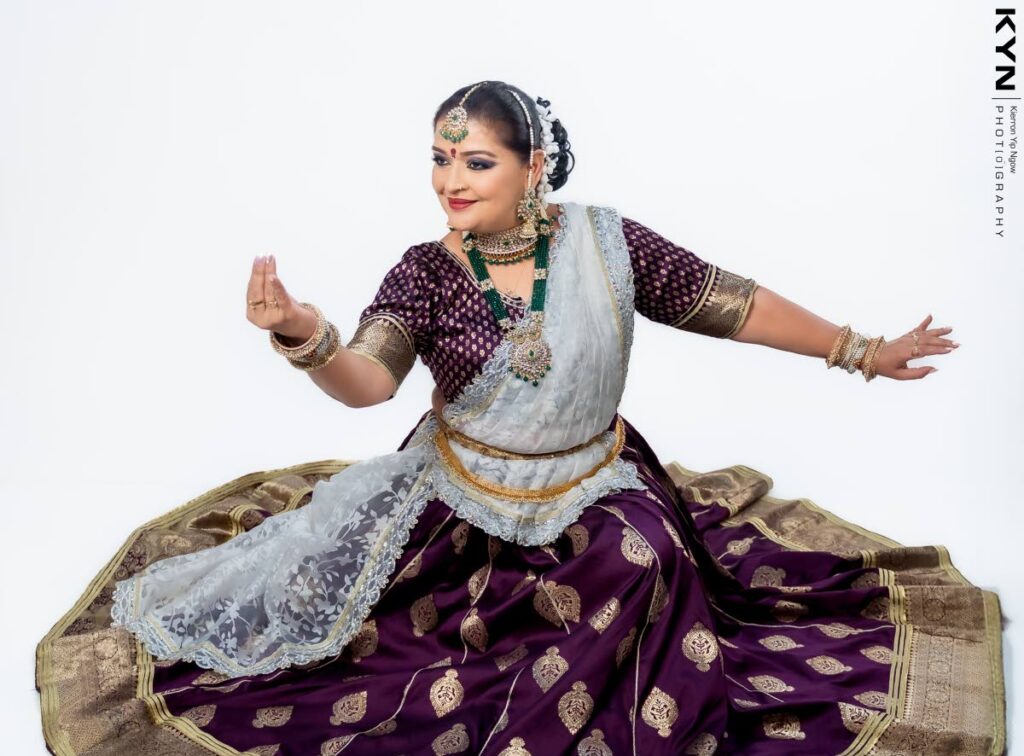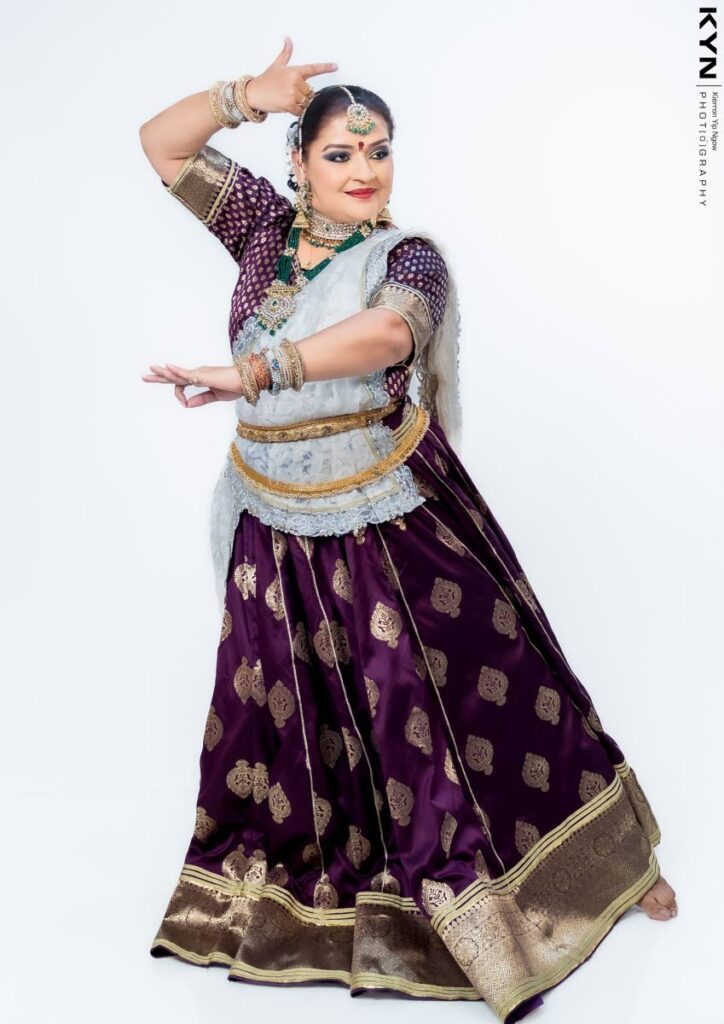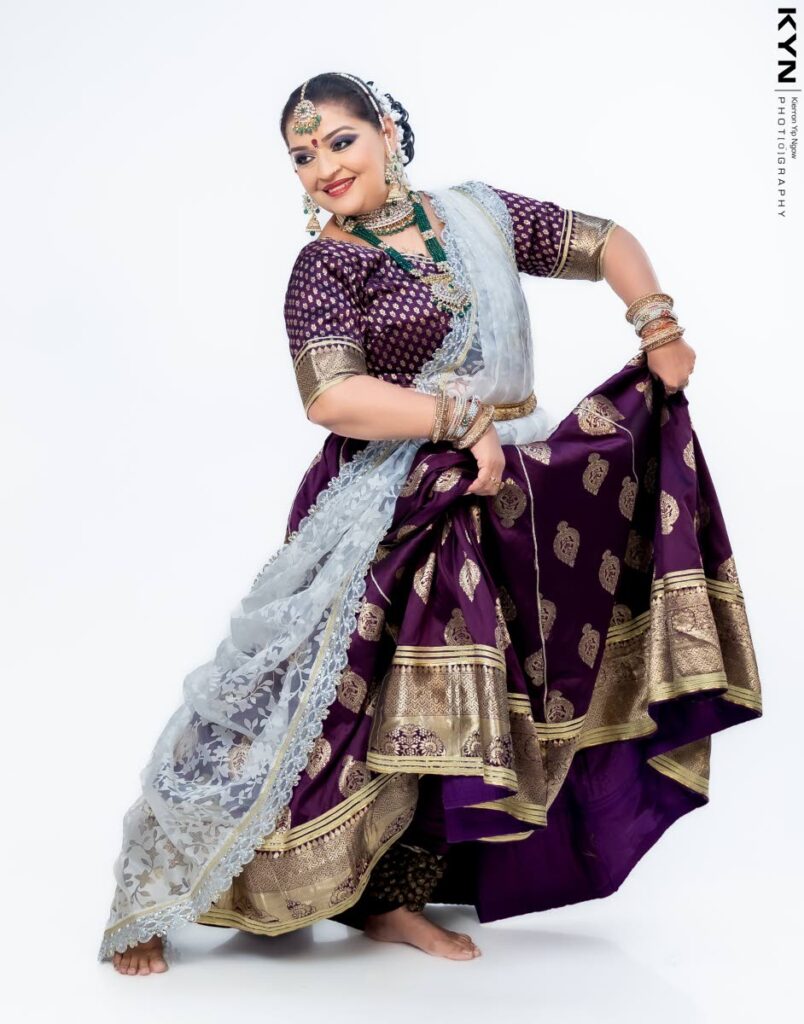Susan Mohip shares her journey as cultural ambassador

BAVINA SOOKDEO
Susan Mohip is a name recognised far beyond Indian classical dance and culture. An embodiment of tradition, modernity, and ambition, her journey reflects the evolving role of Hindu women in Trinidad and Tobago.
With a career spanning over 45 years, the specialist in Indian Kathak dance is a mother of two, and a senior lecturer at the University of Trinidad and Tobago (UTT), where she teaches Indian classical dance. She also serves as the artistic director of the Susan Mohip Dance Company, is the lead female singer for the Sargam International Orchestra, and co-founded the Sangeet Mahavidyalaya music school.
The Gasparillo resident has not only elevated Indian classical arts through her contributions to dance, music and education, but has also inspired countless women to break free from societal expectations while staying deeply connected to their cultural roots.
From the age of three, known as "Baby Susan", many people believed she was destined for greatness as she impressed audiences with her graceful moves and diverse skills.
Nurtured by the love and guidance of her mother – a figure she credits for shaping her into the artist and woman she is today – Mohip told WMN, “Beginning my dancing career with my mom is my most cherished memory. With her guidance and love, I was able to create a career that holds great significance for women today.”
Her rise in the world of dance was meteoric. By the age of four, she became a household name, captivating national television audiences. Reflecting on those early years, she fondly recalled, “They were my best years – innocent, pure, and filled with so much excitement and glamour.”
But behind the glamour was discipline – a trait instilled by her mother.
“My mom was a stickler for discipline, practise, and organisation,” she explained.
“Every Saturday, I practised for four hours with her, learning every routine with precision.”
Despite her success in TT, Mohip knew her journey had only just begun. In 1989, she received an Indian Council for Cultural Relations scholarship from the Government of India to further her studies in Kathak dance under the guidance of the legendary Shrimati Vaswati Mishra. This experience transformed her not only as a dancer but as an educator and cultural ambassador.
“My experience in India was amazing. It grounded me and gave me the tools to bring Indian classical dance to a more meaningful level,” she said.
“I wanted to be more than just an entertainer; I needed to understand the depth of the art form.”

Upon her return to TT, Mohip co-founded the Sangeet Mahavidyalaya and the Susan Mohip Dance Company, making her mark on the local arts scene. But her contributions didn’t stop there. Alongside her husband, Rana Mohip, she co-founded the Sargam International Orchestra.
At the heart of Mohip’s journey is her ability to balance her many roles: dancer, singer, teacher, cultural leader, wife, and mother of two children, Ajnish and Sunanda, who are also involved in the band. Asked how she does it all, she said, “My upbringing gave me the skills to manage my various responsibilities with grace. My mother taught me how to adapt at different stages of life, so I was prepared to balance marriage, motherhood, and my career, and I’ve instilled those values in my own family.”
As a public figure and a role model for Hindu women, Mohip believes that while cultural traditions should be honoured, women must continue to adapt and evolve. “Education is key to everything we do. By uplifting and improving themselves, Hindu women can break traditional expectations while staying true to their cultural roots,” she advised.
Her impact extends beyond the boundaries of performance, as she has become an inspiration for women who want to pursue their passions while managing their family lives.
“Many women come to me wanting to rekindle their love for dance. I tell them it’s never too late. Marriage or motherhood doesn’t have to stop you from pursuing your dreams,” she insisted.
“I can say safely, my journey has influenced a lot of women today to continue pursuing what they love. They can be who they are and I think me being able to continue performing with great success even after being married and having my children has really influenced a lot of young women coming up in the same industry and who are taking the same path."
But, she advises, “Do it, but to do it cautiously. Think of what you really want to project yourself as. Strategic thinking, goal setting and what you stand for through your music and dance are all very important. Remember that you should not have to change in marriage. I truly believe when you move on to another level of your life and you meet the right person, they are marrying you because they love what they saw in you so continue to be you and as genuine as you are to your world and your art.”
She urges women to “Continue to educate yourself, adapt your cultural values to the times, and use your talents to inspire others.”
She said for her, while entertaining is important, the simple act of wearing
sindoor on her forehead represents something much deeper – pride in who she is, pride in her marriage, and pride in the values that define her family life.
"It is a daily prayer for the well-being and longevity of my loved ones. These cultural and traditional practices carry profound meaning, reflecting not only our religious beliefs but also who we are as individuals.”
For Mohip, dance and music are more than just artistic expressions – they are deeply spiritual practices that connect her to her audience on a profound level.

“I dance from my heart to yours.”
She said that's a philosophy by which she lives and one that has helped her connect with audiences both locally and internationally. She said her performances, from early competitions to international tours, have left lasting impressions on those who witness her art. She fondly recalled one of her most memorable childhood performances.
“Performing as the youngest child on Mastana Bahar in the 70s really launched my career and brought me significant recognition. Competing in local shows like
Twelve and Under and Indian Variety also shaped my path, along with performing at weddings, farewell nights, and maticoors are some of my most cherished memories as Baby Susan.
"Touring internationally at age seven to Canada and New York, I received standing ovations that I’ll never forget. After returning from India, performing at Barbados' Virgin Atlantic Season Festival was another career highlight. Dancing with the National Symphony Orchestra to the sound of pan, Trinidad and Tobago’s national instrument, was incredibly special to me. Representing TT and the West Indies at various dance festivals in India filled me with pride, and these experiences remain close to my heart.”
Her vision of the future is one of inclusivity and growth, where Indian classical arts are celebrated by people of all cultures.
“My dream is for Indian classical dance to be embraced by everyone, regardless of background,” she said.
“Through teaching, performing, and producing, I will continue to share my love for this art form and its values with the world.”
Mohip said to TT, “As you light your deyas, send good thoughts and positive energy to family, friends and all in your community.”

Comments
"Susan Mohip shares her journey as cultural ambassador"